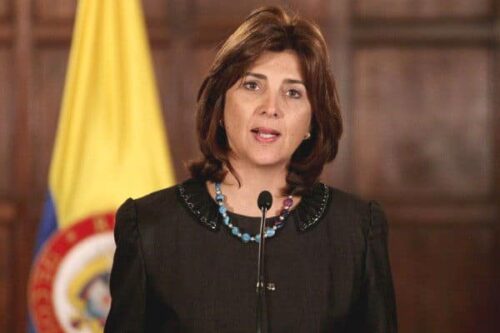The appointment of the former foreign minister of Colombia, Maria Angela Holguin Cuellar, as the UN secretary-general’s personal envoy to Cyprus was finalised on Sunday night, when Turkish Cypriot leader Ersin Tatar issued his approval. It had taken some time for the appointment to be finalised despite President Nicos Christodoulides declaring that an announcement was imminent for months. The Turkish side, reportedly, had rejected other individuals suggested by the UNSG Antonio Guterres before finally giving its consent.
Cuellar, who had also served as Colombia’s head of mission at the UN, has already been accused of pro-Turkish sympathies in some Greek Cypriot quarters, although the evidence provided was rather flimsy. In 2015, she apparently took a position in favour of Azerbaijan in its war with Armenia, while in 2018 she made positive comments about Turkey. The last two special envoys – Alexander Downer and Espen Barth Eide – had both been labelled pro-Turkish by Cyprus governments and the media, but only after they were in the job for a few months.
Former foreign minister, Erato Kozakou-Markoulli, took exception to the appointment of a personal envoy rather than a special advisor. In an interview, published in Politis on Monday, she explained that this was a step backwards because a personal envoy was answerable to the UNSG, and this would allow the Turkish Cypriots to pursue the idea of a two-state solution, thus ensuring there was no common ground for the resumption of the talks. A special advisor, in contrast would be appointed by – and be answerable to – the Security Council, thus work within the framework of its resolutions on Cyprus, she explained.
Would it really make a difference if Cuellar had the role of special advisor? If the Turkish side does not move on its demand for a two-state solution, there will not be a resumption of talks, not because envoy is answerable to the UNSG rather than the Security Council, but because there would be no common ground to justify a resumption.
The same could be said about the dispute over the ‘term’ of the envoy. Last week President Christodoulides said only the UNSG could decide the duration of the envoy’s services while on Sunday night Tatar’s office said the agreement with Guterres envisaged that the “personal envoy would be appointed for a period not exceeding six months, with her exclusive responsibility being to explore if there was common ground for the start of a new official negotiations process.”
The position of the Turkish side is correct. If the personal envoy is unable to find common ground between the two sides after six months of consultations, she may as well pack her bags and return home. If there is no common ground now, it will not exist after two years either. And it would be foolish to believe that a special envoy would be more likely to find it than a personal envoy. If it does not exist, nobody will find it, in six, 12 or 24 months.







Click here to change your cookie preferences